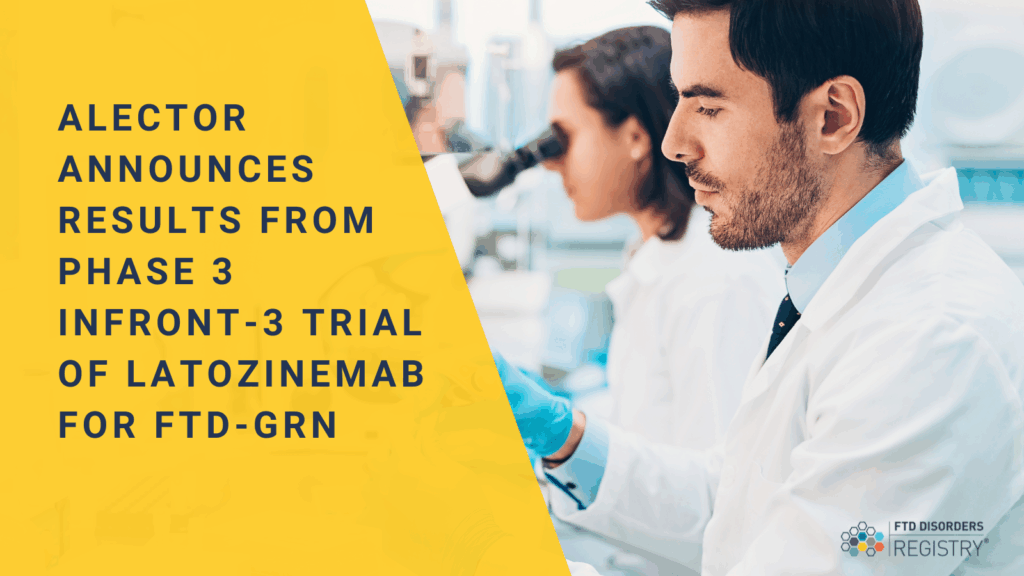PRESS & NEWS
Alector Announces Results from Phase 3 INFRONT-3 Trial of Latozinemab for FTD-GRN

Alector has announced topline results from its Phase 3 INFRONT-3 trial of latozinemab for FTD-GRN.
On October 21, 2025, Alector Therapeutics announced topline results from its Phase 3 INFRONT-3 clinical trial evaluating latozinemab (AL001) for individuals living with frontotemporal degeneration (FTD) caused by variants in the progranulin gene (GRN).
See Alector’s press release here: Alector Announces Topline Results from Latozinemab Phase 3.
Trial Findings
The company reported that the study did not meet its primary clinical endpoint, which measured changes on the Clinical Dementia Rating® plus National Alzheimer’s Coordinating Center Frontotemporal Lobar Degeneration Sum of Boxes (CDR® plus NACC FTLD-SB) scale, a tool used to assess FTD symptoms.
While latozinemab successfully elevated progranulin levels, those increases did not translate into measurable clinical benefits. The treatment also did not show changes in other key indicators, including biomarkers and imaging results.
For more details, see AFTD’s press release.
Next Steps for Participants
Based on the results, Alector has indicated that the active open-label extension and continuation study will be closed. Participants should expect to hear directly from their local study site regarding next steps and are encouraged to direct any questions to their site contacts.
A Step Forward, Even in Disappointment
Although these results are disappointing, the completion of the INFRONT-3 trial represents a meaningful achievement. Conducting a large-scale clinical trial in a rare disease like FTD is a tremendous scientific and logistical effort, and each completed study moves the field forward.
“While the results of the INFRONT-3 trial are disappointing, they do not diminish the progress we are making as a field,” said Carrie Milliard, MS, CGC, CCRC, Director of the FTD Disorders Registry. “Each study, even when the outcome is not what we hoped, brings us critical knowledge that shapes the path to future therapies. The courage and commitment of families who participate in trials remain the driving force behind this progress, and their contributions will continue to guide us toward new approaches. We remain steadfast in our belief that treatments for FTD are possible, and every step – whether a success or setback – brings us closer to that goal.”
We join AFTD in expressing deep gratitude to every person who participated in the INFRONT-3 trial, along with their families and caregivers. Volunteering for research is an extraordinary act of generosity and hope that lays the foundation for future breakthroughs.
Continuing Research in FTD-GRN
The field of FTD-GRN research remains active and promising. Multiple teams are investigating other therapeutic strategies, including gene therapy and small-molecule approaches aimed at restoring progranulin levels or modifying disease pathways.
To learn more:
- Watch AFTD’s Genetic FTD Clinical Trial Landscape session from the 2025 Education Conference
- Explore other FTD studies currently enrolling participants on the Registry’s Find-A-Study page
Stay Connected
We know this news may bring questions and concerns for many in the community. AFTD is planning a virtual Town Hall in the coming weeks to give families, participants, and researchers a space to discuss these results and what they mean for future research.
Stay tuned for more information on the date and time of this session.
Together we can find a cure for ftd
The FTD Disorders Registry is a powerful tool in the movement to create therapies and find a cure. Together we can help change the course of the disease and put an end to FTD.
Your privacy is important! We promise to protect it. We will not share your contact information.



